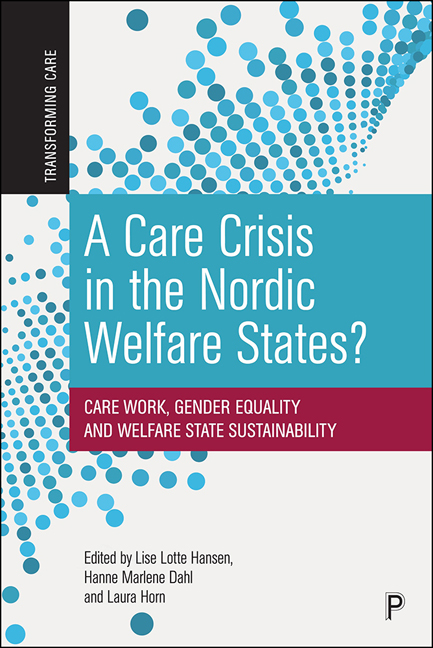 A Care Crisis in the Nordic Welfare States?
A Care Crisis in the Nordic Welfare States? Book contents
- Frontmatter
- Contents
- List of tables
- Notes on contributors
- Preface
- 1 Introduction: A care crisis in the Nordic welfare states?
- 2 The ‘care crisis’: its scientific framing and silences
- 3 Fraser’s care crisis theory meets the Nordic welfare societies
- 4 Crisis of care: a problem of economisation, of technologisation or of politics of care?
- 5 Deteriorating working conditions in elder care: an invisible crisis of care?
- 6 Managerialism as a failing response to the care crisis
- 7 ‘We are here for you’: the care crisis and the (un)learning of good nursing
- 8 Professionalisation of social pedagogues under managerial control: caring for children in a time of care crisis
- 9 Raising quality in Norwegian early childhood centres: (re)producing the care crisis?
- 10 Conclusion: Less caring and less gender-equal Nordic states
- 11 Postscript: A care crisis in the time of COVID-19
- Index
9 - Raising quality in Norwegian early childhood centres: (re)producing the care crisis?
Published online by Cambridge University Press: 13 May 2022
- Frontmatter
- Contents
- List of tables
- Notes on contributors
- Preface
- 1 Introduction: A care crisis in the Nordic welfare states?
- 2 The ‘care crisis’: its scientific framing and silences
- 3 Fraser’s care crisis theory meets the Nordic welfare societies
- 4 Crisis of care: a problem of economisation, of technologisation or of politics of care?
- 5 Deteriorating working conditions in elder care: an invisible crisis of care?
- 6 Managerialism as a failing response to the care crisis
- 7 ‘We are here for you’: the care crisis and the (un)learning of good nursing
- 8 Professionalisation of social pedagogues under managerial control: caring for children in a time of care crisis
- 9 Raising quality in Norwegian early childhood centres: (re)producing the care crisis?
- 10 Conclusion: Less caring and less gender-equal Nordic states
- 11 Postscript: A care crisis in the time of COVID-19
- Index
Summary
Introduction
The care crisis arises from the contradictions between the capitalist society's dependence on social reproduction (caring) and mechanisms in capitalist organisations that undermine the very reproduction on which they depend (Fraser, 2016). Work organisations can in their quest for profit, legitimacy or efficiency, be organised in ways that hamper the combination of childcare and paid work for parents, or self-care for employees. This happens despite the fact that organisations themselves rely on well-functioning labour power premised by social reproduction. Acker (2006) describes the one-sided organisational focus on supporting and enhancing production as a corporate non-responsibility towards caring. The high degree of early childhood education and care (ECEC) coverage and public financing of Nordic ECEC services (Karila, 2012) implies that early childhood centres, organisations, play a vital role in social reproduction. Currently, 91.3 per cent of all Norwegian children aged 1– 5 attend early childhood centres (ECCs) (Statistics Norway, 2020a). This chapter explores traces of the care crisis in Norwegian ECCs, approaching them as work organisations set to produce high-quality care by raising staff competence in cost-efficient ways.
Publicly financed full-time ECEC lies at the heart of the care crisis not only because it transfers care work from parents to organisations, and thereby allows parents the combination of paid work and care. ECCs shall produce high-quality care and education that is regarded as the foundation for citizens’ future labour market participation and national economic growth (Segerholm, 2012). This quality turn is also evident in Norwegian ECEC policy (Ljunggren and Lauritzen, 2018). Lacking competence as a source for low quality is highlighted by OECD reports on the Norwegian ECEC sector (Engel et al, 2015) and is further repeated in the current national strategy for competence raising and recruitment (Ministry of Education and Research, 2017b). This strategy strongly supports a model for raising competence within the ECCs that includes staff in common reflections, co-creation and collaboration with external knowledge suppliers. Subsequently, leaders and staff shall use their work time on guidance and to co-construct learning.
The quality of Norwegian ECCs remains in question, and others have pointed at a lack of organisational capacity as a source of low ECEC quality (Ljunggren et al, 2017).
- Type
- Chapter
- Information
- A Care Crisis in the Nordic Welfare States?Care Work, Gender Equality and Welfare State Sustainability, pp. 158 - 175Publisher: Bristol University PressPrint publication year: 2021
